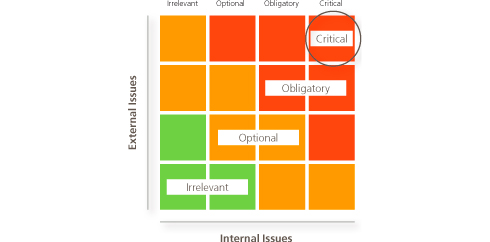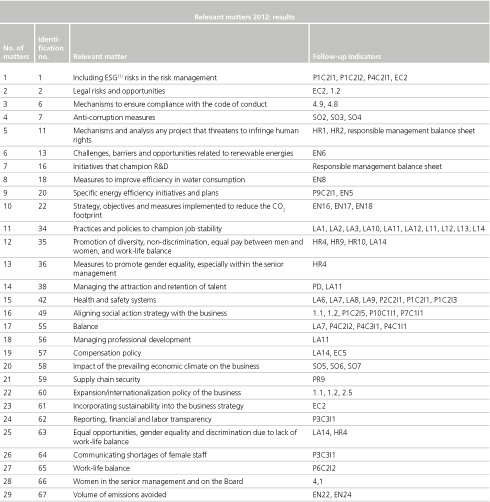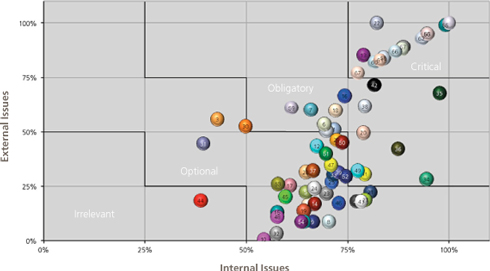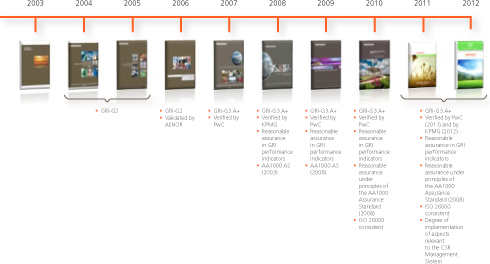 Abengoa
Abengoa
Annual Report 2012
- Corporate Social Responsibility
- About this report
- Principles governing this report
In order to identify material matters, determine the content of the report and guarantee the quality of the information contained herein, Abengoa has applied:
- The three principles establish by the AA1000AS standard: inclusivity, materiality and responsiveness.
- The four principles of the GRI guidance in defining report content: materiality, stakeholder inclusiveness, sustainability context and completeness.
- The principles for defining quality in preparing reports: balance, clarity, accuracy, timeliness, comparability and reliability.
These principles are all interrelated, with the company choosing materiality as the cornerstone underpinning all the others.
Materiality and relevance
The information contained in this CSRR covers those aspects and indicators that reflect the significant social, environmental and economic impacts of the company or any such aspects or indicators that could substantially influence the assessments and decisions of stakeholders. This means any information which, if omitted or distorted, could influence the decisions or actions of the stakeholders of the reporting company. To find out what matters are material and relevant to the company and its stakeholders, Abengoa conducts a yearly materiality analysis.
Analyzing materiality at Abengoa
For the fifth year in a row, Abengoa conducted a materiality analysis in 2012 through a process of selecting material CSR matters founded on two crossing analytical bases: external factors (related to the expectations of Abengoa stakeholders and the importance these attach to the different issues) and internal factors (which determine the importance of the different matters to business, to company management and, ultimately, to accomplishing the objectives envisaged in the business strategy). Making use of both perspectives is essential if we are to respect the principle of inclusivity defined under the AA1000AS (2008).
The company relied on the following sources when drawing up the list of external factors:
- International reporting standards, primarily the GRI and AA1000AS (2008).
- A sector-wide analysis of the main companies similar to Abengoa and of our competitors, both domestic and foreign.
- Socially responsible investors. Analyzing indexes such as the DJSI and the FTSE4Good enables us to pinpoint material issues for investors and shareholders alike.
- International initiatives, such as the UN Global Compact and Caring for Climate. These and other voluntary agreements create a raft of principles that impose commitments on the company. These commitments are assessed every year, allowing the company to identify new material issues.
- Analyzing readers’ reactions to the report for the previous year, which are received through the communication channels set up for precisely this purpose.
- The press and media: analyzing the press exposure and presence of Abengoa and other similar and competing companies. This allows the company to identify positive and negative CSR-related aspects that garnered the most attention from the press.
- Opinion leaders. Abengoa examined the public documents of independent social and sector-specific (energy and the environment) associations and organizations involved in areas of interest to Abengoa and its activities.
- Questions and recommendations put forward by the Independent Panel of Experts in Sustainability Development (IPESD).
- Interviews with stakeholders: the company has taken into account the main aspects unearthed through 24 interviews with stakeholders selected by 2011 Abengoa’s relevant matters committee.
- Internal relevant matters committees attached to the different areas of the company.
- Analyzing the results of the CSR risk assessment process undertaken at Abengoa facilities over the course of 2012.
- Historical log of aspects addressed by Abengoa in previous reports: material matters identified in previous reports.
To assist in the selection of internal factors, the company set up a relevant matters committee, comprising fourteen employees representing different areas of the company and chaired by the director of corporate social responsibility. The committee settled on a series of internal factors by secret ballot (related to the company’s values, policies and strategies and the concerns of the workforce) before analyzing the materiality of both the internal and external factors and the relevant matters gathered from the analogous processes carried out across the company. A list of priorities was then drawn up based on the nature and scale of each aspect analyzed.
The matrix resulting from this relevant matters process flags matters as critical, significant, emerging or immaterial, dictating whether or not it warrants inclusion in the CSR Report.

The five compulsory aspects to obtain the highest score are flagged as critical and must be analyzed in the CSRR in greater detail. Follow-up indicators have been designed for aspects tagged as critical and significant, enabling the company to track them over time.
This year’s analysis revealed the following aspects to be most critical and material:

(1) Environmental, social and governance.

Stakeholder inclusivity and engagement
Abengoa identifies its stakeholders and factors them in when defining its strategy. In addition to maintaining fluid ongoing dialog with them, the company addresses and responds to all their expectations and concerns in its annual report.
In 2012, Abengoa identified approximately 18 endorsers2 for the purpose of consulting them regarding their concerns and to carry out a series of interviews with outside experts who are members of international organizations. The aim is to gain an understanding of both the challenges and trends involving critical CSR-related issues in the sectors where Abengoa operates, and the perception of the company’s performance with respect to these critical issues.
Moreover, and for the fifth year in a row now, having started in 2008, Abengoa underwent assessment in 2012 by an Independent Panel of Experts in Sustainability Development (IPESD)3. This panel voices the views and opinions of company stakeholders and ensures that Abengoa conveys stakeholder-relevant information in its report. The IPESD also provides advice on how the company should tackle these issues. Abengoa’s responses to the questions raised by the IPESD have been verified externally by KPMG and have been awarded a reasonable level of assurance.
Responsiveness
Abengoa can avail itself of numerous resources and tools in order to respond to the concerns and interests of its stakeholders. The company has made every attempt to ensure that the information requested by its stakeholders through its report is as relevant and accessible as possible for the parties concerned. The company therefore has a CSR Master Plan, which defines the sustainability framework and guidelines the company must follow through a raft of actions to help factor stakeholder concerns and expectations into the company’s strategy.
In 2011, the company devised a Responsible Management Balance Sheet, which is reported periodically and comprises a selection of CSR-relevant indicators, thus enhancing the trust of company stakeholders and enabling them to analyze changes in key figures. The company also has an Integrated Sustainability Management System (ISMS) in place, bringing together all material information relating to sustainability, thus making the task of measuring and controlling company performance more accurate and, as a product, improving company management and decision-making.
Completeness
Abengoa attempts to provide full coverage of all material data and aspects significant to its stakeholders so that the latter can evaluate the company’s performance over the period covered by this report.
Sustainability context
Throughout this report, Abengoa assesses its performance in terms of the contribution made to its stakeholders, to the communities in which its presence is felt and to the environment. Also in 2012 the company repeatedly communicated and disclosed aspects relating to sustainability so as to raise awareness among its stakeholders and society at large of the imminent need to ensure that further progress is rooted in sustainable economic growth, allowing future generations to enjoy the same resources that we are enjoying at present.
Principles governing the quality of the information reported
The aim in preparing this report was to reflect the information in keeping with the principles for defining report quality stipulated by the GRI.
Balance
This report provides information on positive aspects, areas in which our performance can be improved and also the company’s objectives. The process of identifying material subject matter (see section on Materiality) also helps us draw up the report. Furthermore, the opinion of the IPESD, as published in this report, provides a picture of how society at large perceives the company’s performance.
Comparability
The content and data published in this report allow readers to analyze changes in the company and how it has evolved. Comparative figures have therefore been included for the previous year, while changes in calculation methods have also been mentioned.
Accuracy
The independent review which this report underwent assures both accuracy of quantitative data and confirmation of evidence and appropriate context for qualitative information.
Timeliness
The report must be presented on time and on a regular schedule, allowing stakeholders to reach informed decisions. Abengoa has been publishing its annual CSRR since 2003. All these reports are available from the company’s website.

Clarity
The information must be made available in a manner that is understandable and straightforward, ensuring that the report can be understood by readers. Abengoa prepares a pdf version and a digital version of its report, both available to the public, and sends the report out to its shareholders, main customers, the media and press, responsible investment institutions and any other interested parties.
In preparing the CSR report, Abengoa has taken on board the recommendations of stakeholders on how the information should be presented. This report also includes a glossary containing definitions of technical terms and any others that readers may be unfamiliar with.
Reliability
Information and processes used in preparing a report should be gathered, recorded, compiled, analyzed and disclosed in a way that could be subject to examination and that establishes the quality and materiality of the information.
© 2012 Abengoa. All rights reserved
